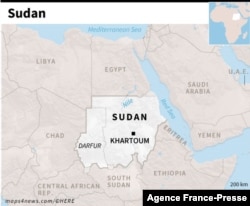As U.N. agencies warn of a looming famine in Sudan, the Office of the High Commissioner for Human Rights says U.N. human rights chief Volker Türk held separate phone calls with Sudan’s rival generals this week to try to deescalate the conflict.
“The high commissioner warned both commanders that fighting in el-Fasher, where more than 1.8 million residents and internally displaced people are encircled and at imminent risk of famine, would have a catastrophic impact on civilians, and would deepen intercommunal conflict with disastrous humanitarian consequences,” Ravina Shamdasani, spokesperson for the high commissioner, told journalists in Geneva Friday.
Since fighting for control of el-Fasher, the last stronghold of the Sudanese Armed Forces in western Darfur, dramatically escalated last week, the United Nations says at least 58 civilians have been killed and 213 injured.
Shamdasani said during separate telephone conversations Tuesday with Sudanese Armed Forces Commander Lieutenant-General Abdel Fattah al-Burhan and Commander of the paramilitary Rapid Support Forces General Mohamed Hamdan Dagalo, Türk “appealed to both generals to put the interests of the people first.”
She said human rights chief Türk, who has been trying to have a conversation with the two competing leaders since August, expressed his “deep distress” at the situation in Sudan and urged them “to take specific concrete steps to cease hostilities.”
Shamdasani said the high commissioner told them “to resume peace negotiations, to ensure that people have access to adequate humanitarian assistance, to not block humanitarian assistance, and to ensure that their troops and their allied forces fully respect international humanitarian law and human rights law.”
She said the generals each acknowledged the importance of respecting international humanitarian law and that SAF Commander Burhan indicated that he would facilitate visas for more U.N. human rights staff.
“The visa issue is an important one,” she said, noting that her office currently has only one international staff member in Port Sudan.
“The high commissioner did ask for his designated expert to get access to Sudan as well as more of our staff to get access, and that was a positive outcome of the call,” she said, adding that “it is very important for us to be on the ground, to be able to cover such important crises more closely.”
Since war between the SAF and RSF erupted in mid-April 2023, the Office for the Coordination of Humanitarian Affairs, or OCHA, reports more than 15,500 people have been killed, some 33,000 others injured, and an estimated 6.8 million have been displaced within the country.
“In Sudan, half of the population, 25 million people, need humanitarian aid,” said Jens Laerke, OCHA spokesperson. “Famine is closing in. Diseases are closing in. The fighting is closing in on civilians, especially in Darfur.”
He said that the U.N. aims to reach and support 15 million of the worst-affected people, and that efforts to help so many citizens were under threat because the U.N.’s appeal for $2.7 billion was only 12% funded.
“This is not just an underfunded appeal; it is a catastrophically underfunded appeal,” he said. “People in Sudan are staring famine in the face.”
The World Health Organization warns famine is looming, especially in parts of Darfur and in the capital, Khartoum, with more than one-third of the population facing acute hunger.
“The number of under-5 children and pregnant and breastfeeding women suffering from acute malnutrition has increased by 22% from 3.9 million to 4.9 million people in 2024,” Dr. Shible Sahbani, the WHO representative in Sudan, said in Port Sudan Friday.
“The recent escalation of violence in Darfur, and particularly in el-Fasher, is alarming and causing more deaths and injuries among civilians as access to health facilities is hampered by the ensuing insecurity,” he said.
The WHO has recorded 62 verified attacks on health care. It says two-thirds of Sudan’s 18 states currently are experiencing multiple outbreaks of killer diseases.
It warns that disease outbreaks such as cholera, measles, dengue fever and malaria are spreading and likely to worsen during the upcoming rainy season “as people living in makeshift shelters will be more exposed to the elements” and access to those in desperate need becomes even more difficult.
“We stand ready to do more and utilize all available avenues to reach the most vulnerable populations across Sudan, but we need assurances of security for our staff and supplies,” Sahbani said, adding that “health cannot be ensured in the absence of peace.”













